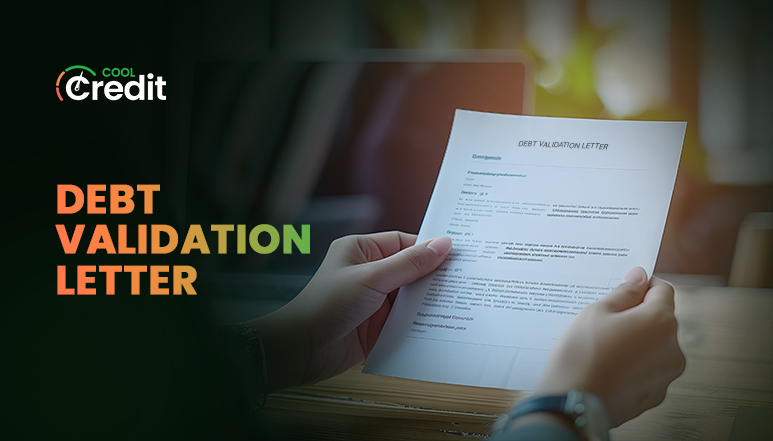
What Is a Debt Validation Letter?
A document or a notice that a debt collector gives informing you about the debt owed by you: the information in the debt validation letter includes the amount you owe, when you are required to pay, and how you can dispute it.
What Is Debt Validation?
Debt validation is when you ask a creditor or debt collector to prove that a debt is real and you owe it. They need to send you a document showing details about the debt, like how much you owe and who originally gave you the credit. This helps ensure you’re not paying something you don’t actually owe.
| What You Need to Know? When debt collectors reach out about money you might owe, they are legally required to give you specific details: Amount Owed: They must tell you how much you owe. Creditor’s Name: They must tell you who you owe money to. Right to Dispute: You can dispute the debt, but you have 30 days from their first contact to do so. If you don't, they can assume it's valid. Proof of Debt: If you dispute the debt in writing, they must send you written proof of the debt. If they call you first, ask them to contact you in writing. They must then send you a letter with all the required information within five days. |
Discover Why Credit Repair is Essential – Start with AI Credit Repair!
Try NowWhat Is the Relevance of a Debt Validation Letter?
The debt validation letter is important because it proves that you owe the money. If a debt collector tries to collect a debt from you without sending this letter, you can ask them to show proof before reporting it to credit bureaus. Debt collectors need to provide written proof of the amount you owe with this letter. Without it, they can't easily prove the exact amount you owe.
| Did You Know? The average U.S. adult carries a debt of $66,772 and a staggering 77% of American households carry some form of debt. Source: RamseySolutions |
Why Is Debt Validation Important?
Debt validation matters for several reasons:
1. To safeguard you against potential scam
Scammers are getting smarter and might try to trick you into paying a debt that doesn’t exist. For example, some might pretend to be a government official and say you owe back taxes, threatening you with dire consequences if you don’t pay. Others might act like real debt collectors. By asking for a debt validation letter, you can check if the debt collector is real and if the debt is yours.
2. It could prevent you from losing money
You can sue the debt collector for providing incorrect information if he fails to prove you owe the debt. Be careful about how you deal with them and in the first place don’t admit to owe the debt if you are unsure of it. Thus, act responsibly and handle these situations carefully.
3. The debt may not belong to you
Sometimes, debt collectors make mistakes or try to collect money you don’t owe. They might be after a debt you’ve already paid or one that isn’t yours at all. A debt validation letter helps you find these mistakes and stops them from asking you for money you don’t owe.
4. Helps with disputes
If you need to challenge the debt, a debt validation letter provides important evidence to support your case.
5. Keeps your credit score safe
Debt validation helps keep your credit score safe by ensuring only correct debts are reported, so mistakes or fraud don’t hurt your score.
6. Shows your rights clearly
Validating a debt shows you what you’re responsible for and helps you understand your rights, so you can make better decisions.
What if the Debt Collector Never Sent Me a Debt Validation Letter?
In case, the debt collector doesn’t send you a letter, you can file a case against them, but, first, ask for a debt validation letter. Under the Fair Debt Collection Practices Act (FDCPA), it’s illegal for debt collectors to ignore your request for a debt validation letter. If they don’t comply, you could have the right to sue them. As a precautionary measure, when you send your request, keep a copy and use certified mail to prove it was delivered.
Now, if you don’t receive your letter within a reasonable time, you can report the debt collector’s unruly behavior to the authorities. Doing so might also help others facing similar issues, as the government may fine or take legal action against the debt collector or agency.
What Is a Debt Verification Letter? How Is It Different From a Debt Validation Letter?
A debt verification letter is something you send when you disagree with the details of a debt. For example, if you get a letter saying you owe $4,000, but your records show you only owe $1,500, you can send a verification letter asking the agency to correct the amount. You can also use this letter to challenge the entire debt if you believe it isn’t yours. In that case, the debt collector must prove that you actually owe the money they claim.
A debt validation letter and a debt verification letter have different purposes. A debt collector sends the validation letter to give you details about the debt you owe, like the amount, the creditor, and what you need to do next. This letter is sent after the collector first reaches out to you.
To make the difference more clear, here’s a table:
| Aspect | Debt Validation | Debt Verification |
| Who Sends It | Debt collector | You (the debtor) |
| Purpose | Provides details about the debt, including amount, creditor, and next steps | Disputes the debt or the amount claimed by the collector |
| Goal | To inform you about the debt | To challenge the accuracy or validity of the debt |
| Time To Respond | Typically within 5 days of initial contact | Generally, within 30 days of receiving the initial debt notice |
What Should Be Included in the Debt Verification Letter?
A debt verification letter should include:
- Debtors name and address.
- Information about the original lender.
- Collection agency’s name and address.
- A clear statement that you challenge the debt.
- A request to see proof that the collection agency is licensed.
- Details about the debt’s start date and original due date.
- A detailed breakdown of added fees and interest.
If you have already settled the debt, focus on rebuilding your credit and regularly monitor your credit score to track your progress.
See Real Results – Download AI Credit Repair App & Improve Your Credit
Learn MoreTake Control of Your Financial Health With CoolCredit’s Real-Time Credit Monitoring
Stay on top of your finances with CoolCredit’s 24/7 credit monitoring. Receive timely insights and alerts to spot any unusual activities that could affect your credit score or profile.
Here’s what makes CoolCredit a top choice:
▪ DIY Credit Repair App: CoolCredit’s app makes starting your credit-building journey easy and seamless.
▪ Dispute Letter Templates: CoolCredit provides pre-written dispute letters to help you quickly address and correct credit report errors.
▪ Expert Assistance: Receive dedicated support throughout your credit-building, improvement, and repair process.
▪ Credit Resource Library: Access a wealth of educational resources on all aspects of credit.
Conclusion
Understanding and using a debt validation letter is a powerful tool in managing your financial health. It ensures that any debt collectors contacting you provide proof that the debt is valid and accurately reported. By requesting this letter, you protect yourself from paying debts you don’t owe and help safeguard your credit score. For ongoing credit monitoring, CoolCredit stands out as a top choice. With real-time updates and valuable resources, CoolCredit - your ai credit repair helps you stay on top of your financial health and ensures your credit remains in good shape.
FAQs
Q: How Long Does It Take for a Debt Collector to Respond to a Verification Request?
A: Debt collectors don’t have a fixed timeframe to respond to a debt verification request. However, they are required to send a debt validation letter within five days of their initial contact with you. In case, you don’t receive the letter within 10 days, you can file a complaint with the Consumer Financial Protection Bureau.
Q: When Should I Send a Debt Verification Letter?
A: Ideally, you should send a debt validation letter, if the debt doesn’t belong to you or is inaccurate. Ensure that you send the letter within 30 days of their contact or else they may pursue further assuming the debt is valid.
Q: Do Debt Validation Letters Really Work?
A: Yes, they do. A debt validation letter asks the collector to prove the debt is real. If they can't provide proof, they must stop trying to collect the debt.
Q: I’ve Already Settled the Debt; How Can I Monitor My Credit Score?
A: To keep track of your credit score after settling a debt, use CoolCredit’s credit monitoring. With CoolCredit, you get real-time updates on your credit report, and access tools to help you stay on top of your financial health. This way, you can easily monitor your progress and ensure everything stays on track.
Q: What Is a Validation of Debt Letter, and Why Do I Need It?
A: A validation of debt letter is a document you ask for from a debt collector to prove that you really owe the debt. It helps ensure that the debt is accurate and that the collector has the right to collect it from you. This way, you can avoid paying for debts you don’t actually owe or that are being handled wrongly.
Q: What Happens After You Send a Debt Verification Request?
A: According to ConsumerFinance, if you send a written request for verification about the original creditor within 30 days, the debt collector must stop trying to collect the disputed amount until they properly respond to your request.
Q: What Happens If You Ignore The Debt Validation Letter?
A: If you ignore the debt validation letter, the creditor or debt collector might think you’ve accepted the debt and keep trying to collect it. They might even take legal action against you. If you don’t respond, you lose the chance to dispute the debt, making it harder to challenge later.







